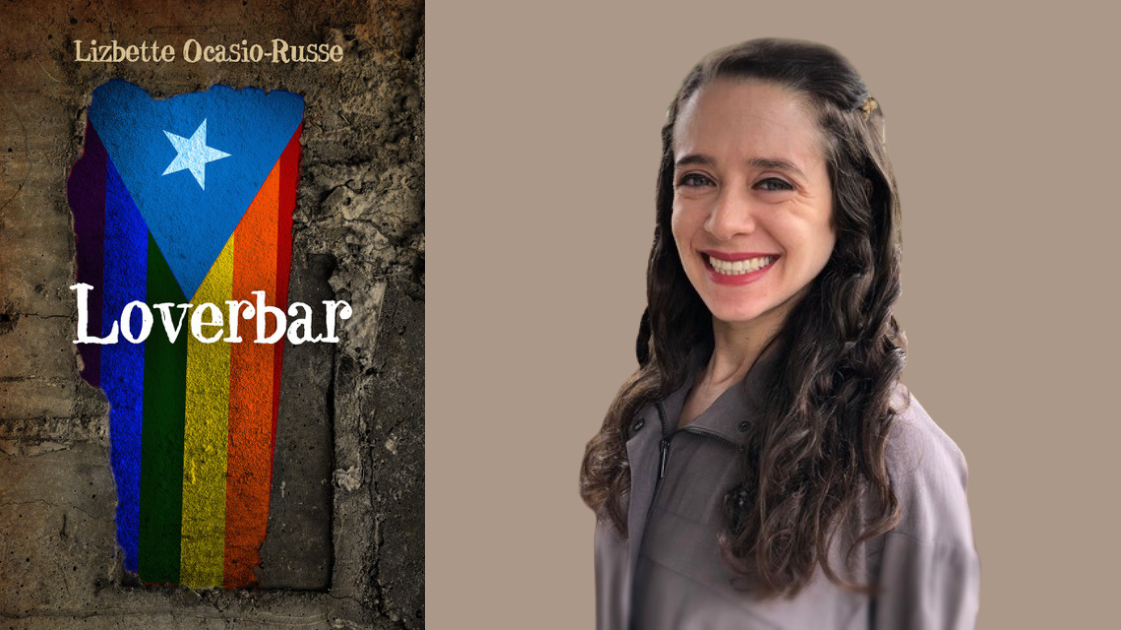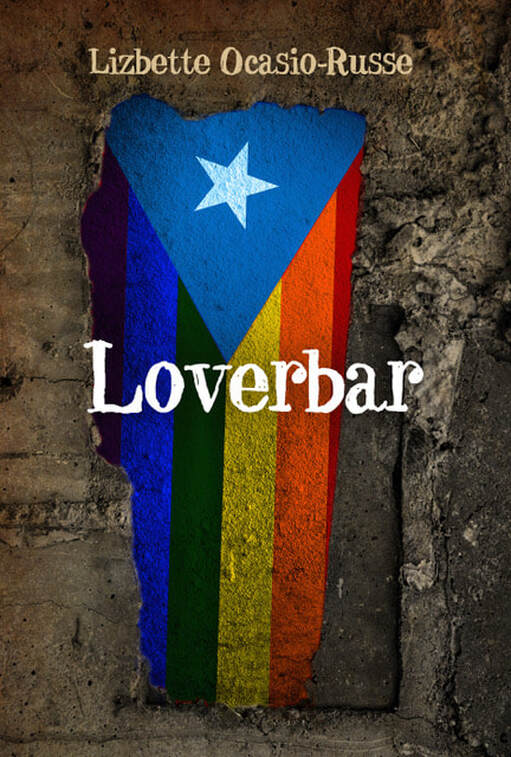Loverbar
Lizbette Ocasio-Russe
|
When you purchase a book through our site, we earn an affiliate commission and so do independent book stores.
|
After a category 4 hurricane devastates her country, the first requisite of Graci, the focal character who stiches together a series of short stories set in Puerto Rico’s cuir community, is to stay put and rebuild. The second is to “know when to ask for help and accept it.”
When we first meet Graci, the protagonist of Loverbar (2023), she is battling writer’s block, substance addiction, and a defeatist voice in her head she names “Karen.” She is doing cocaine lines in hopes that inspiration will strike for her before a newspaper deadline and before Hurricane Maria touches down. She is a 20-something femme punk writer/waiter with a love of animal print clothes, excessive eye make-up, and her friends. Graci is saving for a down payment on a gay night club in San Juan she’ll call Loverbar, a cuir space that will hold the many splendored gendered and sexuality formations that are misidentified even within marginalized queer spaces of PR. The ruin and repair from Hurricane Maria in 2017 thru post-Covid days is echoed in the characters’ lives and loves. Ocasio-Russe plays with the metaphor of devastation with Hurricane Maria as a watershed moment for the Caribbean nation. It is an environmental event with a potent sociopolitical afterlife setting the island in the crosshairs of global and local crisis. Loverbar’s plot moves between events before, during, and after Maria following characters’ memories. The novel focuses on the important and often overlooked role of the queer community in actual protest actions in PR following the failures of the government in restoring power and circulating aide on the island. One of Loverbar’s most compelling characters is Pinky, a transwoman and drag performer whose small acts of political resistance speak to the frustrations and hopes of the group. Pinky has dated Eduardo, “ a poser,” who uses protest gatherings as an excuse to party. Mabel, an academic about to embark on a long distance relationship with Lissandra after being accepted in a Public Policy PhD program in the U.S. wonders if leaving the island is selling out. Sammy, a butch lesbian, butts heads with her abuelita on her gender presentation. Lola does virtual drag to pay “bills and groceries” for her mother and grandmother during Covid despite their claims of her vulgarity. Valeria wears her heart on her sleeves and is often left in potentially violent situations after her cisgender male lovers discover she was assigned male at birth. |
In the synecdochally crafted chapter “Rhythmic Resistance,” queer desire and the making of a safe cuir space is teased out for the reader. We see what is at stake for post-Hurricane Puerto Rico. Valeria shows up at a night club with a new beau, Manuel. “She struggles to stay on beat with an off-beat partner.” This seems to be a running theme within the novel as the characters each encounter push back from family, lovers, and even geographic spaces that get gentrified into propriedad privado. That evening, the deejay interrupts the music to broadcast the fictionalized governor’s resignation. Valeria jumps on stage with other women and takes off her top in a celebratory dance that ends up on tv. Escaping Manuel’s rage and fist, she calls him a coward remembering the homophobic beating death of a friend, Alexa. Unfortunately, such transformations are not available for everyone.
Ocasio-Russe is highly attuned to the world being fictionalized in Loverbar as the characters are loosely based on real people and interviews. The author’s note at the end of the novel offers the reader a historical and social overview of U.S. relations in Puerto Rico since 1898. In addition, we are invited to think through the array of cuir identities that Loverbar is meant to keep safe and showcase such as queer of color life, alternative queerness, and forms of drag that move beyond cisgender pageant aesthetics into being performative protest. Through backloaded facts of the performer Adi Love, Jhoni Johnson (the real-life owner of Loverbar) and others, the novel illustrates the complex transnational aspect of Puerto Rico-U.S. relations. Although we are meant to follow Graci as a kind of trace through this queer transnational Puerto Rican scene, it is clear that in her world, as in ours, the diversity of identities is too capacious. Such a representation can only be glimpsed amidst the chaos of a hurricane and in the care of those brave enough to say, Me voy a reventar, and then stay behind to do something about it.
Ocasio-Russe is highly attuned to the world being fictionalized in Loverbar as the characters are loosely based on real people and interviews. The author’s note at the end of the novel offers the reader a historical and social overview of U.S. relations in Puerto Rico since 1898. In addition, we are invited to think through the array of cuir identities that Loverbar is meant to keep safe and showcase such as queer of color life, alternative queerness, and forms of drag that move beyond cisgender pageant aesthetics into being performative protest. Through backloaded facts of the performer Adi Love, Jhoni Johnson (the real-life owner of Loverbar) and others, the novel illustrates the complex transnational aspect of Puerto Rico-U.S. relations. Although we are meant to follow Graci as a kind of trace through this queer transnational Puerto Rican scene, it is clear that in her world, as in ours, the diversity of identities is too capacious. Such a representation can only be glimpsed amidst the chaos of a hurricane and in the care of those brave enough to say, Me voy a reventar, and then stay behind to do something about it.
Lizbette Ocasio-Russe is an Assistant Professor of English at Texas A&M University, Corpus Christi. She completed her PhD in Humanities at the University of Texas at Dallas. She received her BA in Journalism and minor in Creative Writing from New York University and her MA in English Literature from the University of Puerto Rico, Rio Piedras campus.
Loverbar is a publication by Flashpoint Publications.
Loverbar is a publication by Flashpoint Publications.
Comment Box is loading comments...
|
|









